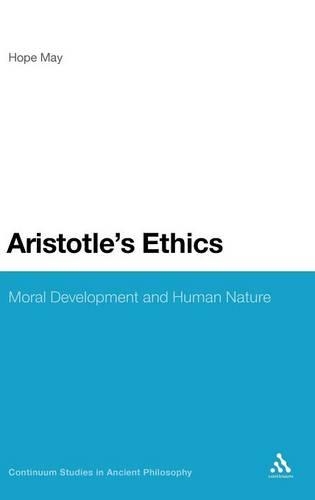
Aristotle's Ethics: Moral Development and Human Nature
(Hardback)
Available Formats
Publishing Details
Aristotle's Ethics: Moral Development and Human Nature
By (Author) Dr Hope May
Continuum Publishing Corporation
Continuum Publishing Corporation
18th February 2010
United States
Classifications
Tertiary Education
Non Fiction
Ancient Greek and Roman philosophy
171.3
Physical Properties
Hardback
208
Width 156mm, Height 234mm
Description
Aristotle's Nicomachean Ethics is devoted to the topic of human happiness. Yet, although Aristotle's conception of happiness is central to his whole philosophical project, there is much controversy surrounding it. Hope May offers a new interpretation of Aristotle's account of happiness - one which incorporates Aristotle's views about the biological development of human beings. May argues that the relationship amongst the moral virtues, the intellectual virtues, and happiness, is best understood through the lens of developmentalism. On this view, happiness emerges from the cultivation of a number of virtues that are developmentally related. May goes on to show how contemporary scholarship in psychology, ethical theory and legal philosophy signals a return to Aristotelian ethics. Specifically, May shows how a theory of motivation known as Self-Determination Theory and recent research on goal attainment have deep affinities to Aristotle's ethical theory. May argues that this recent work can ground a contemporary virtue theory that acknowledges the centrality of autonomy in a way that captures the fundamental tenets of Aristotle's ethics.
Reviews
'May's interpretation seems to explicate exactly how Aristotle understood the relationship between the intellectual life ... and the practical (moral) life ... According to May's interpretation, the conflict other scholars have perceived is simply an artifact of a misinterpretation of Aristotle's text. The moral life, she argues, is a necessary prerequisite for the attainment of the intellectual life--one simply cannot become a true intellectual unless and until one has fully mastered (and has become fully habituated to) being moral ... May's view is important not merely for its insight and originality. It also seems to me to get exactly right one of the most important and influential ethical works ever written.' Nicholas D. Smith, James F. Miller Professor of Humanities, Lewis & Clark College, Oregon * Blurb from reviewer *
Author Bio
Hope May is Associate Professor of Philosophy at Central Michigan University, USA. She received her Ph.D from Michigan State University in 2001. In 2008, she received her J.D. degree from Michigan State University College of Law, graduating magna cum laude and winning awards for her work in free expression, international law, and legal interpretation.
